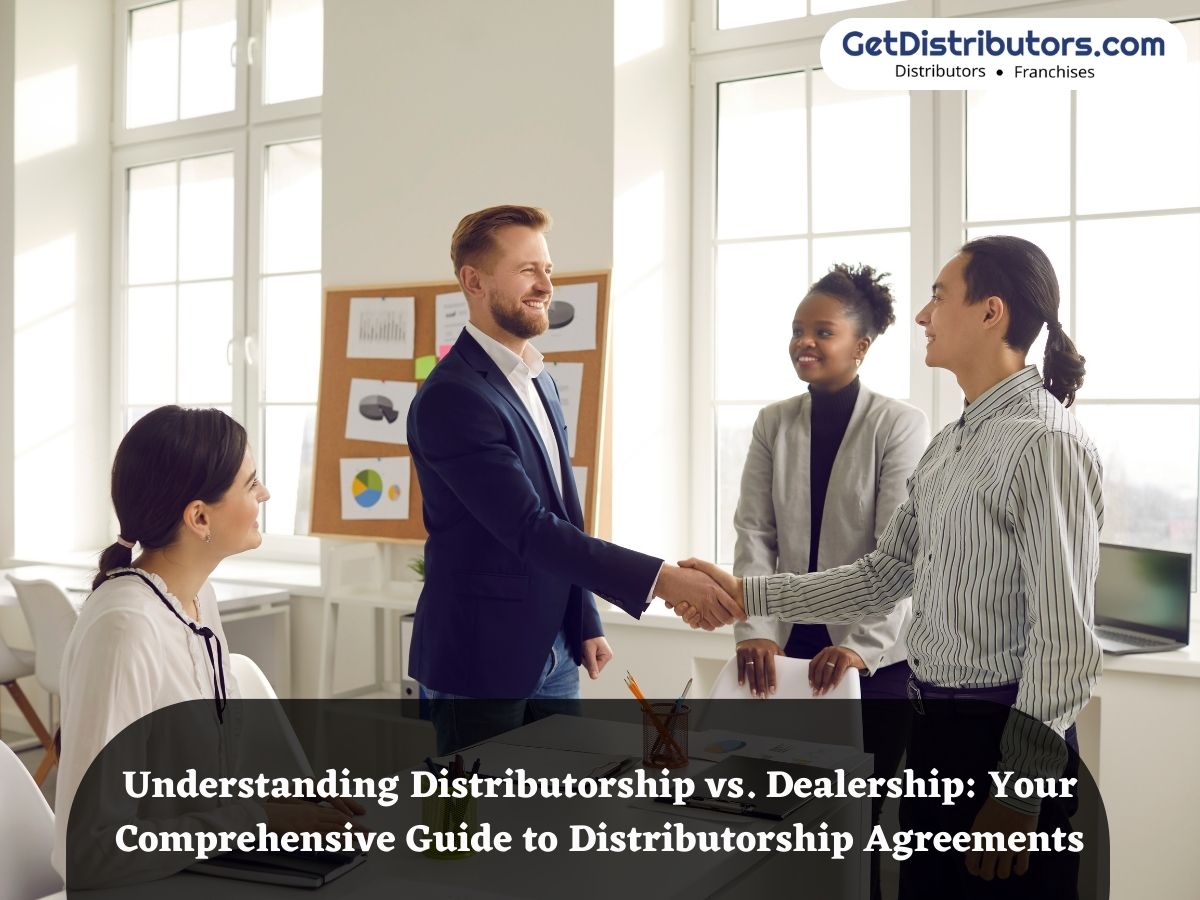Comprehensive Guide to Distributorship & Dealership Agreements
Though distributor and dealer both are the most important parts of the supply channel how do they differ from each other, get to know here:
The distributor works with the manufacturer to sell their products in the targeted territory. The targeted location may be a part of a region, zone, state, or metro city, depending on the product and area. The business of distribution requires the amount to invest and a warehouse for product storage. The distributor pays the wholesale price to the manufacturer and sells to the dealer or retailer keeping their margin on the product price.
Big names opting for the Distributorship Model
Hindustan Unilever, Siyaram, TCL Corporation, etc. are the giants that adopted the distribution model to multiply their business network.
A dealer is an individual or firm that purchases goods from a manufacturer or distributor and sells them through retailing. Dealership is similar to distributorship to an extent but involves retailing a product directly to the end consumer. Opting dealerships of renowned brands come up with nationwide marketing, lucrative incentive schemes, training support, and customer support.
Examples of dealerships are branded Car showrooms, White goods retail stores, Multi-brand garment stores, etc.
The supply chain almost in all cases goes as:
Manufacturer —> Distributor —> Wholesaler —> Dealer/ Retailer —> Consumer
Comparison
Below are the major points from which one can consider how distributors and dealers are different from each other:
|
|
Distributor |
Dealer |
|
What are they |
An individual or organization that re-sells the products through various channels. |
A person or business that buys and sells the products to the consumers. |
|
Known by |
They are general distributors who deal in all types of products |
They are known by the product names of their transaction |
|
Link between |
They are the link between the manufacturer and the retailers and rarely sell goods directly to consumers |
They are in direct touch with the customers |
|
Profit margin |
Bigger as compared to the dealers |
Up to the limited range |
|
Receive products from |
They get products directly from the manufacturers |
They get products from manufacturers or distributors |
|
Subjective |
Appointed for a specific location and faces no competition |
Faces competition in the area in which they do business |
|
Products can be sold to |
Can sell the products to many dealers at a time |
Supposed to sell the products and/or goods only to specific users |
Guide to the Distributorship Agreement
A distributorship agreement is a contract between channel partners who stipulate the responsibilities of both parties. The agreement is usually between the manufacturer and distributor. In some cases, it may involve two distributors or a distributor & some other channel entity.
The basic elements of this agreement include the time period for which the contract is in effect, exclusivity or non-exclusivity, and terms & conditions of supply. In an exclusive agreement, the specified distributor will be the only one having the right to sell the products in a specified geographic location.
A well-drafted agreement is the key to maintaining and establishing a good working relationship in a channel partnership. Negotiations which result in mutually agreed terms & conditions are vital whether you are the owner of the business or the distributor. Incorporate a checklist into contract negotiations to make sure the agreement defines clear expectations, addresses the duties and responsibilities, and includes safeguards that are designed to protect the interests of both parties.
Following is a checklist of agreements that are necessary to be considered while drafting a distribution contract:
-
Terms and conditions of sale
-
Term for which the contract is in effect
-
Marketing rights
-
Trade mark licensing
-
Exclusivity or non-exclusivity.
-
Non-competition.
-
Performance
-
Reporting
-
The geographical territory covered by the agreement
-
Circumstances under which the contract may be terminated
Types Of Distributorship Agreements
A distributorship may take any one of the following forms:
|
Sole Distribution |
Where a ‘sole’ distributor sells products in a region or to a customer group, then no other distributor is appointed in that territory or for that customer group- it’s a condition of the governing agreement. |
|
Exclusive Distribution |
In the case of exclusive distribution, the supplier/ manufacturer is closed out from selling the goods directly to the territory and may not appoint another distributor to do so.
|
|
Non-Exclusive Distribution |
This ‘non-exclusive’ distributorship allows the supplier/ manufacturer to sell directly and to appoint more distributors within the area.
|
|
Selective distribution |
Selective distribution agreements are those in which a network is established through outlets that meet certain minimum requirements such as premises, ability to provide proper sales service, staff training, etc. These types of agreements are often used for hi-tech goods where specialization is important.
|
|
Exclusive purchasing |
Those agreements in which the distributor agrees to buy certain goods for re-sale only from the supplier.
|
Both the parties i.e. the distributor and the manufacturer should have adequate knowledge of the above-mentioned points. Browse the most lucrative distribution business opportunities online.
For More Details:
Call on: 08037304045
Mail ID: helpdesk@getdistributors.com
Disclaimer: The information provided is for general purposes only and does not constitute professional advice. The author and publisher do not guarantee the accuracy or completeness of the content. Business decisions should be made after thorough research and consultation with professionals. The mention of specific companies or products does not imply endorsement. Financial estimates are based on available data and may change. The author and publisher are not liable for any actions taken based on the content. Readers are advised to independently verify information before making business or financial decisions.





